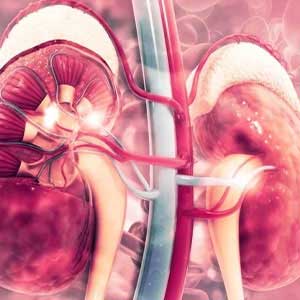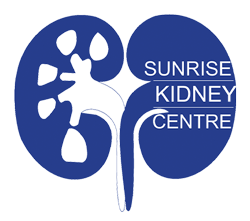Chronic Kidney Disease (CKD) in Vijayawada
Chronic kidney disease (CKD) is a progressive condition characterized by the gradual loss of kidney function over months or years, impairing the body's ability to filter waste, excess fluids, and electrolytes effectively. Unlike acute kidney injury, which occurs suddenly, CKD develops insidiously and often remains asymptomatic until advanced stages, making early detection crucial. Common causes include diabetes mellitus, hypertension, glomerulonephritis, and polycystic kidney disease, which damage the delicate nephrons within the kidneys. As CKD progresses, individuals may experience symptoms such as fatigue, swelling, urine changes, and anemia, along with an increased risk of cardiovascular complications. The disease is staged based on the glomerular filtration rate (GFR), with stages 1 through 5 indicating increasing severity, culminating in end-stage renal disease (ESRD) requiring dialysis or transplantation. chronic kidney disease treatment in Vijayawada focuses on controlling underlying conditions, slowing disease progression, and addressing complications like mineral and bone disorders or cardiovascular health. Despite advancements, CKD remains a significant global health challenge due to its silent progression and the substantial burden it places on healthcare systems, emphasizing the importance of early diagnosis, lifestyle modifications, and regular monitoring at best kidney hospital in Vijayawada to improve patient outcomes.

Factors contributing to Chronic Kidney Disease (CKD)
Chronic kidney disease (CKD) arises from a variety of underlying causes, often linked to long-term health conditions and lifestyle factors. Diabetes mellitus, particularly type 2 diabetes, remains the leading cause, as elevated blood sugar levels damage the small blood vessels in the kidneys, impairing their filtering ability over time. Hypertension or high blood pressure also plays a significant role, exerting excessive force on renal arteries and glomeruli, leading to scarring and reduced kidney function. Glomerulonephritis, an inflammation of the kidney’s filtering units, can result from autoimmune diseases or infections, gradually diminishing renal capacity. Additionally, prolonged use of nephrotoxic medications such as NSAIDs or certain antibiotics can cause cumulative kidney damage. Genetic predispositions, such as polycystic kidney disease, contribute to CKD development through cyst formation that replaces healthy tissue, impairing function. According to kidney doctor in Vijayawada other factors include prolonged dehydration, repeated urinary tract infections, and exposure to environmental toxins like heavy metals or industrial chemicals. Lifestyle choices such as smoking, excessive alcohol consumption, and poor diet can exacerbate risk factors by promoting atherosclerosis and hypertension, further impairing renal health. Ultimately, CKD is often a multifactorial disease, with a complex interplay between genetic, environmental, and metabolic influences that progressively compromise kidney function over time.
Symptoms associated with Chronic Kidney Disease (CKD)
Chronic kidney disease (CKD) often manifests through a diverse array of symptoms that can be subtle initially yet progressively worsen as kidney function declines. Early signs may include fatigue and weakness due to anemia caused by reduced erythropoietin production, and swelling in the legs, ankles, or feet resulting from fluid retention. Patients might experience changes in urination patterns, such as increased frequency, especially at night, or decreased output, along with foamy urine indicating protein loss. As toxins accumulate, symptoms like nausea, loss of appetite, and metallic taste in the mouth can develop, alongside persistent itching from mineral imbalances. Cognitive disturbances, including difficulty concentrating or memory lapses, may also occur. Additionally, high blood pressure is both a cause and consequence of CKD, often exacerbating kidney damage. In advanced stages, patients may exhibit shortness of breath due to fluid overload or anemia, and bone pain or muscle cramps can emerge from mineral and electrolyte imbalances. These symptoms reflect the kidneys' declining ability to filter waste and regulate essential bodily functions, emphasizing the importance of early detection and management to slow disease progression and improve quality of life.
How to prevent Chronic Kidney Disease (CKD)
Preventing chronic kidney disease (CKD) involves adopting a comprehensive lifestyle approach focused on maintaining overall kidney health. Regularly monitoring blood pressure and blood sugar levels is essential, as hypertension and diabetes are leading causes of CKD; managing these conditions through medication, diet, and exercise can significantly reduce risk. Staying well-hydrated by drinking adequate water helps the kidneys efficiently filter toxins, but avoid excessive fluid intake if kidney function is compromised. Emphasizing a balanced diet rich in fruits, vegetables, and whole grains while limiting salt, processed foods, and high-protein diets can lessen strain on the kidneys. Incorporating physical activity into daily routines not only helps control weight but also lowers blood pressure and improves cardiovascular health. Avoiding smoking and limiting alcohol consumption further protect renal function by reducing oxidative stress and inflammation. Regular check-ups with healthcare providers for kidney function tests can catch early signs of damage, enabling timely intervention. Additionally, avoiding the overuse of non-steroidal anti-inflammatory drugs (NSAIDs) and other nephrotoxic medications can prevent drug-induced kidney injury. By integrating these proactive strategies into daily life, individuals can significantly lower their risk of developing CKD and promote long-term kidney health.
Clinical Management of Chronic Kidney Disease (CKD)
Chronic kidney disease (CKD) management aims to slow progression, alleviate symptoms, and prevent complications. Treatment begins with controlling underlying causes such as diabetes and hypertension through lifestyle modifications, including dietary adjustments, smoking cessation, and regular exercise. Pharmacotherapy plays a crucial role; ACE inhibitors and ARBs are first-line agents to reduce proteinuria and manage blood pressure. For anemia associated with CKD, erythropoiesis-stimulating agents (ESAs) and iron supplementation are employed. Managing mineral and bone disorders involves phosphate binders, vitamin D analogs, and calcimimetics to maintain mineral balance. In advanced stages, patients may require renal replacement therapy, such as dialysis—either hemodialysis in Vijayawada or peritoneal dialysis—to perform the kidney’s filtering functions. Kidney transplantation remains an optimal treatment for suitable candidates, offering improved quality of life and survival rates. Emerging therapies focus on novel pathways like anti-fibrotic agents and regenerative medicine, aiming to halt or reverse kidney damage. Additionally, comprehensive patient education, regular monitoring, and multidisciplinary care are vital to optimize outcomes and enhance patient adherence. Personalized treatment plans tailored to disease stage, comorbidities, and patient preferences are critical for effective CKD management.
If you are at risk or have a family history of kidney disease, it’s crucial to schedule regular check-ups with a specialist to monitor your kidney health. Whether annually or biannually, routine tests are an effective method to assess kidney function. For additional information on chronic kidney diseases, you can visit Sunrise Kidney Centre and schedule a consultation with Dr. M.V. Sai Krishna.

